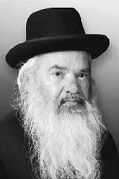A Short Tribute
Hacham Levi Sa'adia Nahmani was born to Rina and Hacham Yaakov in Marrakesh, Morocco, on 11 Adar 5681 (1921). He was born after his parents' previous children had died as babies and was named after Hacham Eliezer Halevi, his parents' rabbi, and after Hacham Sa'adia Rabah, at whose tomb his parents had prayed for children.
Hacham Levi Sa'adia Nahmani studied with his father, with Hacham Yaakov Hazut and Hacham Avraham Abitbol and was ordained by Hacham Shalom Messas.
Hacham Levi Sa'adia Nahmani and his spouse, Phoebe, had four sons: Israel, Ben-Zion Meir, Shaul and Sar-Shalom.
Hacham Levi Sa'adia Nahmani taught in the Otzar HaTorah Talmud Torah and in 1954 was appointed to the Neve Shalom yeshiva. During the period that followed, he also taught Bible and Talmud in the teacher's Beit Midrash in Casablanca.
In 1964 Hacham Levi Sa'adia Nahmani immigrated to Israel, settling in Jerusalem's Bait VeGan neighborhood. He was one of the founders of the Beit Shmuel synagogue in the Shmuel HaNavi neighborhood and of Darcei No'am – an institute for Torah study for adults and for youth. Hacham Levi Sa'adia Nahmani taught Torah and Judaism in universities and ran afternoon lessons for youth.
Hacham Levi Sa'adia Nahmani passed away on 7 Shevat 5755 (1995) and was buried on Har HaMenuhot in Jerusalem.
Hacham Levi Sa'adia Nahmani wrote Brit HaLevy, a commentary on the Zohar, and various booklets, including Ve'Anta HaShira HaZu, which treats contemporary issues and the topic of redemption.
